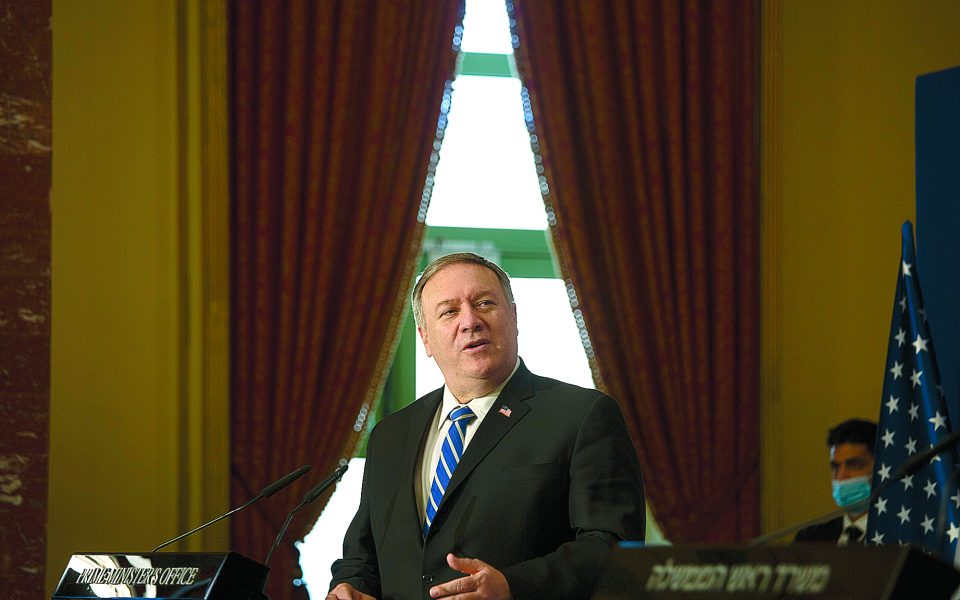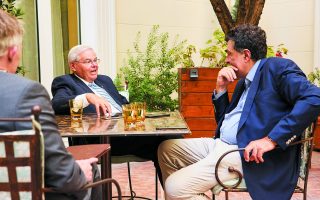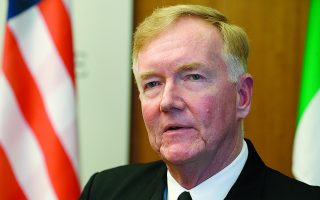‘I was always concerned about an accident’
Former US secretary of state speaks about Greece, Turkey and the challenges during his tenure

Former US secretary of state Mike Pompeo is a star of the Republican party and seen as a likely contender for the White House in the 2024 race. Meanwhile, as demonstrated by his presence at events held to mark the visit of Ecumenical Patriarch Vartholomaios in the United States, he maintains very close ties to the Greek-American community.
In an interview with Kathimerini, Pompeo recalls the concern he and ex-president Donald Trump felt when tensions flared between Greece and Turkey. He explains why he sent a letter to the Greek premier in which he affirmed Washington’s commitment in supporting security in the Eastern Mediterranean.
“I hope that [Turkish officials] will continue to understand that complying with international law makes an awful lot of sense,” he says.
Pompeo also expresses his satisfaction with the completion of the Greece-US defense deal, initially negotiated during his tenure, and describes the Trump administration’s interaction with the former SYRIZA-led government.
Pompeo is critical of Turkish President Recep Tayyip Erdogan, adding that the “Turkish people understand that their best place is with the West.”
What makes Patriarch Vartholomaios’ visit to the US so important?
What’s important to all the Christians and Orthodox here in the United States, and I think for people of every faith, is that he represents a deep, fundamental understanding of religious freedom and commitment to the Lord. And this is deeply consistent with who we are as Americans as well. So for them to get a chance to meet this amazing man, our Holiness Vartholomaios, is truly remarkable. And he’s had the chance to travel to places off the East Coast, like West Virginia and the heartland of America. I think it’s just a true blessing for the United States of America to have the chance to be with him and to pray with him.
Is there also a geopolitical dimension? He met with the president, after all.
Yes, the Ecumenical Patriarchate, and especially with Vartholomaios at its head, plays an important role in the way people think about security and freedom around the world. And it represents the greatness of sovereign nations around the world, this understanding of treating every human being with the dignity which they deserve, because they’re created in the image of God. So there is an international component to this too, because the Church itself is one, made up of organizations from all across the world. There have been those who have tried to use the Church for political ends. This is not useful. The Church has an important role to play for every human being and we ought to do our level best to make sure that we don’t allow bad actors to use the Church for their own political sovereign ends.
I want to ask you about US-Greek relations. You initiated the negotiation of the defense agreement, which was concluded under this administration. I wonder how you feel about that. And you were also the first secretary of state to address a letter to Prime Minister Kyriakos Mitsotakis referring to Greece’s security and so on.
It’s very important for the United States. I’m thrilled that they concluded the defense cooperation agreement. That’s a really good outcome. We made a lot of progress, but they got across the finish line. So good for all of them, for the prime minister and for the Biden administration as well. I issued the letter because it is really clear that the Greeks are trying to abide by international law and its normative behaviors about how nations interact. And we have a nation in Turkey that has been provocative in ways that aren’t helpful to the Turkish people, to Turkish leadership, frankly to NATO and certainly not to building an important, strong foothold in the Eastern Mediterranean. I wanted to make clear that we support those nations that recognize international law and behaviors that are consistent with that. And Greece has certainly done it. I issued the letter because of that.
You are also the first secretary of state to visit Greece without visiting Turkey at the same time, sort of leaving the equal distance policy behind. Did you meet with any resistance, from State or career diplomats?
There are hundreds of opinions inside the Department of State. I am confident that not everyone thought that would have been the best decision, but I think most people understood. I traveled to Turkey multiple times, as secretary of state as well. We want to be good partners and friends. We want them to be a full-throated supporter of the NATO mission. We’ve tried to convince them it was a bad idea to buy a Russian high-end sophisticated S400 defensive system, but couldn’t convince them not to take that weapon system. That’s a mistake for NATO, it matters to the United States, but it matters to every NATO country and the security from the threat that we face from Russia today and frankly, from China as well. So, we worked at it, with every country, to try and build up a better set of relationships. That particular trip made sense for me, to go to Greece to have that conversation. I had lots of talks about energy issues in the Eastern Med and the Mediterranean energy basin, really important conversations about how to build security and prosperity in the Eastern Mediterranean. We want Turkey very much to be part of that. I hope that they will continue to understand that complying with international law makes an awful lot of sense.
Do you think Turkey would be different if President Recep Tayyip Erdogan were gone?
I think that’s for the Turkish people to decide, in the end. I think that Turkish people understand that their best place is with the West, that their lives will be better, that their families will be in a better position, supporting religious freedom inside the country in the way that the Ecumenical Patriarch Vartholomaios does. Those are good things for the Turkish people and I think they know that. So I am optimistic that Turkey will continue what has been a long path toward the West and I pray that it will continue.
Tensions between Greece and Turkey ran very high during your tenure. Was there a moment when you were seriously concerned about some form of confrontation?
You always worry when ships are moving around. Accidents happen and things that neither nation in a tense situation can resolve from there. I was always concerned about an accident that could lead to a spiral of behavior. That’s not just Greece-Turkey, there are other places in the world as well. But my conversations with the Turks always made clear that they weren’t spoiling for a big, breaking confrontation either. They have a different view on some of the issues of international law. That doesn’t bother me. They’re permitted to hold different views. There is a dispute resolution mechanism to address those different views. We wanted them to get into that dispute resolution mechanism and not take matters into their own hands with a unilateral provocative set of actions. Those were the things we asked for. I was always mindful that the best the United States could do was be there to listen and to try and encourage them both to comply. We did that every day. I was worried about a lot of things during my time as secretary of state.
I remember both President Donald Trump and yourself being deeply involved in this issue at some point, correct?
Oh, yes. We were both working diligently on this, to make sure that the tensions, the risk that were there, were handled in a way that was consistent with the way that those kinds of disputes ought to be resolved. There were days when it was dodgy, it was very tense. We managed, in each instance, to get the parties back to talking, as they were trying to find their way through, to negotiate a solution to the different views they hold on particular sets of boundaries and property rights, and maritime rights as well.
At the beginning of your tenure there was a leftist government in Greece. What was it like working with them? You negotiated some tough deals, correct? Were you surprised by that?
No, the Greek people get to choose who they want to lead them. We developed a deep set of relationships with Prime Minister Mitsotakis. But the people get to choose, and the relationship is between the United States and Greece. We’ve now changed administration. Greece is working now with our current president. That’s how nation-states interact. Look, there’s always folks that are more difficult in sharing the US value set and US understandings, not only of security arrangements but economic arrangements as well. We were pretty clear we were going to build out our “America first” foreign policy. We wanted to find partners that were working, that wanted to work alongside us, to make life better for each of our two nations. We would do that, within limits, with any democratically elected leader.
Is there a single moment that sticks in your mind during your tenure, in your dealings with Greece or Turkey, or all these issues?
One of the things that I’m most proud of is the work we’d begun to do in the energy space. To begin to strategize about how we can deliver abundant affordable clean energy, not only to the Eastern Med, but further as well, like connections with Egypt potentially, connections into southern Europe. These are important interconnectivities. You think of a secretary of state as doing diplomacy, but when we can get the economics right, when we can connect nations so that they can create jobs and wealth for their people, it makes the diplomacy a heck of a lot easier.
And also, I assume, the strategic relationship between Israel and Greece and Egypt.
Yes, they are important, and wonderful. Great leadership from Greece has built that relationship. I’m confident that Prime Minister Mitsotakis will continue to do that with the new leadership in Israel as well. It’s an important set of understanding and I am confident too. I’ve seen Foreign Minister [Nikos] Dendias traveling to the Gulf States as well, talking to Arab nations and trying to build up relationships between Greece and other Arab states. I applaud them for that effort.
The withdrawal from Kabul and American priorities
Do you think the events in Kabul changed the perception of US policy and US prestige?
Yes, I think it was damaging to American credibility, at least to the credibility of this administration. It wasn’t the decision to pull the last remaining American uniformed personnel out of there that caused this diminution in American credibility, it was the manner in which it was conducted. The incompetent execution of that, the fact that we left some of our own citizens behind, the fact that the world could see it was chaotic. It did not have to be that way. We also didn’t do right by our partners and friends who were supporting us. The NATO mission that was there in Afghanistan as well. We worked closely with them for my entire four years to make sure that we’d gotten in together and we would all get out together. And we left some of their folks behind as well and didn’t provide them with the resources they needed to do the things they needed to do for their own people and their own forces. I regret that. I think the world saw that America didn’t handle that well. I hope this administration will find ways to continue to build American credibility. There is no nation in the world that any country should want to partner with like the United States of America. We can deliver so many good things to so many of our friends and partners around the world. Countries should want to be parties with us, but they have to know they can rely on the things we tell them. That was one of the things I was most proud of in the Trump administration. It wasn’t every day that everyone in NATO liked the things that I told them or the things that we told them. But I think we were always just incredibly transparent and clear, and we lived up to those commitments each and every time.
There’s also a sense in the area, in the East Med, that perhaps the US is withdrawing in order to deal with China and other threats. Is that a valid perception?
I don’t think so, no. It’s an important region to the United States of America. Not only the Eastern Med, but the Middle East and Southern Europe. We have important economic interests and geostrategic interests there. No, I don’t think this decision in Afghanistan portends a withdrawal from these places in terms of American priorities. We all have to tackle the threat that is the Chinese Communist Party. It is the single greatest threat to Greece, to Europe, to the United States of America, that exists on this planet. We all have to confront it in a serious way, but I don’t think it’s an either/or matter. I think it’s the case that we can keep our eye on multiple balls simultaneously, with precision and with good partners like Greece.





